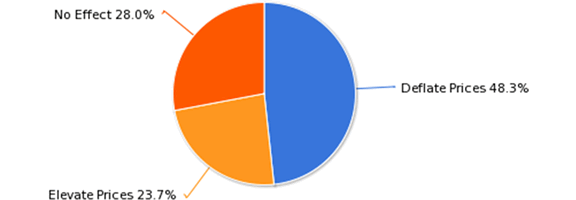July’s LANDTHINK Pulse revealed 48.3% of respondents believe a long term rise in interest rates would deflate land prices.
Typically, when long term interest rates increase, real estate prices tumble. This correlation is likely due to the fact that most buyers have no choice but to finance a home or land purchase. A buyers’ purchasing decision is often based upon an amount they can afford to pay per month. Simply put, high interest rate equals high monthly payment. The average person has no desire to make a large purchase when interest rates are high; consequently, sellers that have to sell their property are inclined to offer it up at a great deal.
Last month, the July Pulse asked: If the Federal Reserve raises long term rates, what affect will it have on land prices? The overwhelmingly popular answer to our informal online survey was “Deflate Prices”. Coming in second, but not by a close margin, was the response “No Effect”.
Our survey results seem to confirm what most of us already knew to be true. When long-term rates rise, loans become more expensive and real estate becomes less affordable. Weaker demand, leads to lower prices.
Here’s how the final results panned out:

- 48.3% Deflate Prices
- 28.0% No Effect
- 23.7% Elevate Prices
Congratulations to John Morrow, winner of the $50 Amazon gift card after answering the July Pulse question! John is Associate Broker for Land Pros Realty in Gretna, Nebraska, and also a real estate attorney.
Thank you to everyone who participated and shared the Pulse with friends and connections in the land industry.
LANDTHINK is seeking sponsors for the September LANDTHINK Pulse and months thereafter. Sponsorship of the Pulse is an excellent opportunity for land industry businesses and professionals to receive significant exposure by leveraging our entire network of web and social media sites. Pulse sponsorships are offered on a first come first serve basis and are subject to certain limitations. If your business would be interested in sponsoring next month’s September Pulse question, please contact us soon.
What portion of your investment portfolio is in land? Tell us what you think! Click here to answer the August Pulse question. All respondents will be automatically entered to win a $50 Amazon gift card!
This content may not be used or reproduced in any manner whatsoever, in part or in whole, without written permission of LANDTHINK. Use of this content without permission is a violation of federal copyright law. The articles, posts, comments, opinions and information provided by LANDTHINK are for informational and research purposes only and DOES NOT substitute or coincide with the advice of an attorney, accountant, real estate broker or any other licensed real estate professional. LANDTHINK strongly advises visitors and readers to seek their own professional guidance and advice related to buying, investing in or selling real estate.










Higher interest rates reduce land values in ways other than those related to purchase-financing issues.
Most of our transactions for land are purchased on a “cash” basis by our buyers, so the cost of borrowing money doesn’t directly effect the purchase from a cash buyer.
Indirectly, you will see our cash buyers putting their money into alternative investments (other than land) as the interest rates rise because their cash becomes more valuable and offers them increased returns as interest climbs.
Higher interest rates tend to make alternative investments more favorable than land resulting in reduces land values… and reduced activity in sales.
The return on investment from agricultural and recreational land purchases have not offered much in the way of competition against alternative investments, however it has offered a solid place to park your money in a risky economy and additionally shown benefit from appreciated land values in many areas. Historically it has been more common to profit from the re-sale than from the annual return.
If you want to see cheaper land prices, high interest rates should deliver that result.
Consequently, the “cash” nature of our sales do not require any appraisals or financing, which further inflates land values by raising comparable-sales in the area. Expect the best comps for an appraisal are the “cash” transactions that didn’t involve a lender or an appraiser.
thanks
With the business we’re doing in Texas, the only buyers who are getting financing are the ones who don’t really need it which fits with the old saying that the banks only loan to those who don’t need the money! The deals we’ve been doing are buyers offering in cash then closing in financing because the land banks make them an offer too good to be true. So with rates going up, these great financing offers won’t be available and we’ll be back to people just paying cash like always. Frankly, our land financing down here has been very difficult to get in the past so should fewer people be going that route, we’d be back to where we were before the recession. Also worth mentioning is the housing stimulus package that used to give first-time buyers $8k: laughable at best netting no more than unqualified looky-loos who never pulled the trigger. So, the bigger picture seems to be the argument that low interest rates make any significant dent in the woes for any area of real estate during this recession. The rates are a red herring whereas the ridiculous government regulations set by Fannie & Freddie (“condotels”, refusing to look at assets in lieu of earnings, etc) and the fact that the banks are investing their bailout money in the stock market rather than loaning it to those who need it resulting in a hugely inflated stock market and thus a false economic “recovery”.